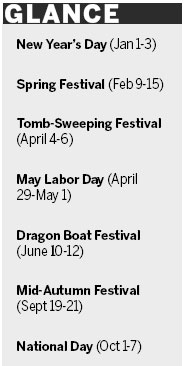Government announces 2013 holidays
By Wang Xiaodong (China Daily) Updated: 2012-12-11 10:12The State Council announced on Monday the dates of China's seven major holidays next year.
In addition to international dates, such as New Year's Day and Labor Day (May 1), the list includes traditional Chinese holidays such as Spring Festival (Feb 9 to 15) and Mid-Autumn Festival (Sept 19 to 21).

On most holidays, Chinese receive a day off from work, but the Spring Festival and the National Day holidays are exceptions, each allowing three days off, according to the central government.
In addition, each holiday will be extended by at least two days, as is usual, so people can have several days off, with the preceding or following Saturday and Sunday becoming workdays to make up for the time.
For example, New Year's Day will fall on Tuesday, and the official holiday period is from Jan 1 to 3. The following Saturday and Sunday, Jan 5 and 6, will be workdays.
Twenty-nine holiday days are planned next year. But their arrangement has prompted some complaints.
"I just checked and found I will have to work for eight consecutive days after the three-day New Year's Day holiday," said Yun Fei, who works at a Beijing IT company. "It's going to be too tiring. I'd rather just have a day off on Jan 1."
Many people expressed similar viewpoints online.
The United States has 10 federal holidays next year. When a holiday falls on a Saturday or Sunday, the holiday is observed the preceding Friday or following Monday.
England and Wales have eight bank holidays next year, each counting for one day off work.
In addition to national holidays, Chinese workers are entitled to an annual paid leave of from five to 15 days, depending on how many years they have worked for a company.
Xiao Fang, a professor of folklore at Beijing Normal University, said there are reasons behind the government's decision to extend major holidays to several continuous days.
"An advantage is that this arrangement makes short-distance trips possible, and they couldn't be made on a single day," he said.
Zhang Chengdong, secretary-general of Jiangsu Festivals and Events Association, said the length of some holidays could be made more flexible to suit different needs.
Spring Festival, the traditional Chinese New Year, which falls in winter, for example, could be prolonged for workers in some sectors whose business is relatively low in winter, he said.
"The length of holidays is related to a country's development," Zhang added. "With society becoming more affluent, people in China will be able to enjoy more holidays and leisure."
Zheng Jinran contributed to this story.
wangxiaodong@chinadaily.com.cn
- Survey: Many bosses don't pay holiday overtime
- China retail, catering sales surge in holiday
- High-speed railway passengers surge in holiday
- Capsule hotel hot during holiday
- Pet boarding services boost during holidays
- Holiday causes property sales slump in Beijing
- The Great Wall witnessed peak time during holiday
- Cosmetic surgery tourism boost during holiday
- Woman resigned from high salary job to make notebooks
- China greenlights 96 fixed-asset investment projects in Jan-June
- China's electricity consumption picks up in H1
- Oil majors retain top positions on Fortune's 500 list
- Chinese airline to operate direct flights between Hainan and Cambodia
- NDB to issue $448m green bonds
- Abu Dhabi, Shanghai join hands for free zones development
- China's economic reforms will profit Europe: expert


















